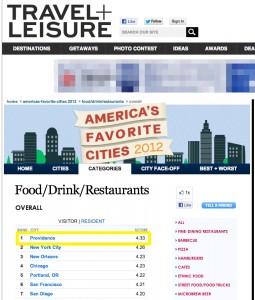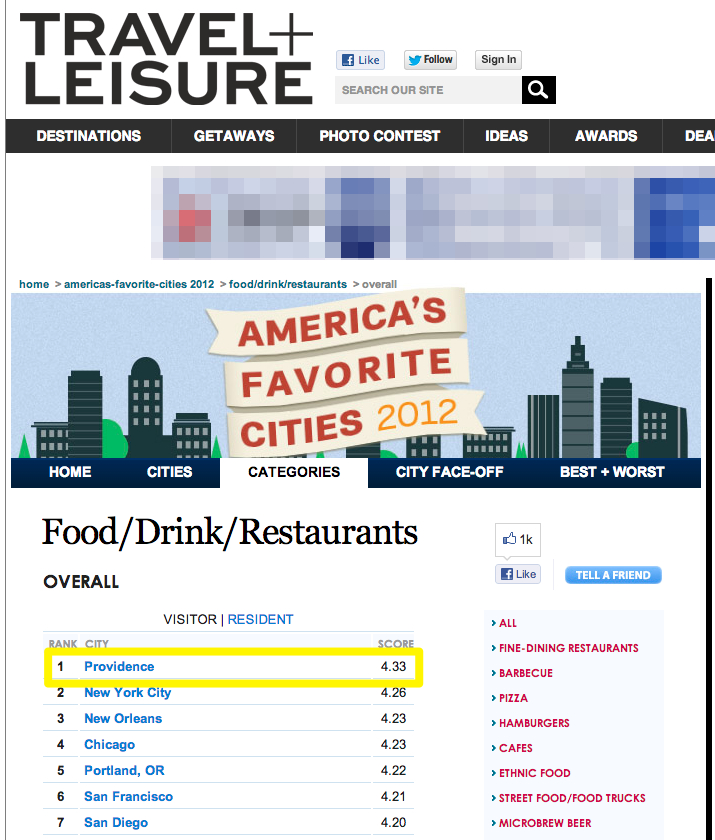
Recently, Johnson & Wales University President Mim Runey shared with the Providence Journal the university’s efforts to help grow the city’s thriving food cluster. She highlighted a few stats that show how RI’s food cluster has grown over the last decade, contributing to the local economy:
- Industries involved in “purchased meals and beverages” grew from $1.6 billion to just under $1.8 billion.
- Industries in “accommodations” grew from $286 million to $416 million.
- Jobs in food services and drinking places grew by 10 percent.
- Jobs in accommodations grew by more than 8 percent.
- Jobs in food and food-related occupations grew by 9.3 percent.
I was fortunate enough to be on the project team when the Initiative for a Competitive Inner City and Next Street worked with JWU leadership as JWU thought strategically about how to better position itself as a key leader in the food cluster. JWU is exploring innovative opportunities in all business components of the cluster, including marketing, entrepreneurship and new business development. While JWU continues to be a key contributor to Providence’s food cluster growth, there are also many other reasons why Providence can (and should) be a leader in food.
Providence’s food renaissance began emerging over many years, beginning with the proliferation of community farms and farmer’s markets across the state. Not unlike many regions of the country, consumers in Rhode Island became increasingly conscientious of healthy food and sustainable agriculture. While the Southside Community Land Trust began in 1981, demand for local and organic food grew in earnest throughout the late 1990s and early 2000s. Farm Fresh RI was created in 2004 to support the local food system by building capacity along the entire food value chain: producers, markets, and consumers. Today, the state ranks as one of the highest for direct sales specifically because of the success of the many farmers markets, stands, and CSAs. There are over 600 farms in Rhode Island, and at least one farmers market in every town. The system of farmers markets in the state has driven over 40% of the growth in the agricultural economy over the last 10 years. Many JWU faculty and alumni are known for using locally-sourced ingredients for classroom instruction and at RI restaurants owned and operated by JWU culinary experts.
In no small part, the advocacy and leadership of the RI Food Policy Council was a boon for local farmers, including the Rhode Island Food Assessment, “a comprehensive resource for stakeholders throughout the state who are working to strengthen the Rhode Island food system … [to] move food from Rhode Island farms and fisheries to consumers in all Rhode Island communities.” The Council focuses on increasing access to local healthy food, increasing the production of and demand for local food, promoting sustainability, and generating equitable economic opportunities for all Rhode Islanders. Additionally, the Rhode Island Agricultural Partnership’s 5-year strategic plan is aligning the efforts of the state’s agricultural producers and creating a single vision for agriculture in Rhode Island.
But the food cluster is more than community gardens and farmers markets. Providence has also developed a very dense food truck scene over the past 4 or 5 years. It can be argued that Providence started the mobile food trend when Walter Scott created the first horse-drawn diner wagon in 1872. The Haven Brothers Diner has had its perch next to Providence’s city hall since the 1950s. More recently, dozens of new food trucks have popped up offering an assortment of foodstuffs that is dizzying: wood-fired pizza, Korean BBQ, grilled cheese sandwiches, tacos, mac ‘n cheese, pulled pork, pudding pops, and cupcakes to name only a few. The expansion of mobile food choices is providing food entrepreneurs opportunities to enter the food business with minimal capital costs.
Additionally, the entire food distribution system is changing with the recent creation of Market Mobile, an online ordering and delivery system that connects farms to restaurants, grocers, schools and hospitals around Providence, Newport, Westerly and the Boston metro area. In 2012, family farmers and producers sold $1.5 million of local food through Market Mobile, a 50% increase from 2011.
The Farm to School initiative fosters healthy eating habits in children and every public school district in the state participates to some degree. In the 2011-2012 school year, the state’s public schools spent $175,000 on food from RI farmers, about 250,000 pounds of locally-grown produce and milk. In 2013, Farm to School is expanding its reach to connect farmers with pre-K, private schools, colleges, and hospitals. One challenge to scaling these programs is the distribution channels of the food service companies that currently service institutions in the state. School districts, however, can and should increase local procurement requirements upon renewal of food service contracts.
Additional innovations in the food cluster are on the horizon, including a permanent, year-round Public Market in Providence that will include a wholesale aggregation and distribution center, public kitchen space, a kitchen incubator, and a nutrition classroom. There is an enormous shared value opportunity for JWU to support and benefit from this endeavor and creating innovative new pathways for JWU graduates.
Johnson & Wales University and its Culinary Arts program is a strong key player in Providence’s growing food cluster, enmeshed in an ecosystem that supports and reinforces it in innumerable ways. Rhode Island has a history of marine research driven by the University of Rhode Island and leads the nation in shellfish farming innovation and sustainable fishing. In June, the Sustainable Agriculture and Food Systems Funders held its 2013 Annual Forum in Providence, and last month the 2013 Ronald C. Baird Sea Grant Science Symposium was hosted in Warwick, at which “The Future of Shellfish in Rhode Island” was presented. Innovation in food production and distribution is a critical element for the food cluster and can strengthen Providence’s competitive advantage.
JWU is embracing its own strategic commitment to blend the culinary arts with science through the JWU / Tulane University School of Medicine’s culinary medicine collaboration. This is the first time a medical school and a major culinary institution will partner to develop joint curriculum for doctors, medical students, chefs and the community about the significant health role that food choices and nutrition play in preventing and managing obesity and associated diseases in America. Other university stakeholders include Nutrition and Food Sciences at the University of Rhode Island, Packaging, Illustration, andIndustrial Design at the Rhode Island School of Design, and Innovation Management and Entrepreneurship and Medicine at Brown University.
Providence is also the home of United Natural Food Inc., the nation’s largest distributor of organic and natural foods, innovative high-growth companies likeEdesia, selling nutritious ready-to-use foods to treat malnutrition in 35 countries around the world, and food-related social ventures like Amos House’s Culinary Education Program and Friendship Café and RallyRI, an organization focused on create startup businesses in four economic sectors including food.
The food cluster is supported by organizations such as Eat Drink RI which shares information about the state’s food community and RI Food Fights, a hosting of light-hearted public culinary competitions in various categories. Lastly, Edible Rhody tells the stories of the state’s farmers, chefs, fishers and food and beverage artisans who work and live in Rhode Island.
Providence does food right! And this is why Providence was named as host city for the very first Taste Trekkers food tourism conference held on September 20-22. Moreover, many of the accolades for the nation’s best food that are awarded to Providence are due to the culinary expertise and entrepreneurism of JWU graduates. JWU is a strong reason why Providence’s food cluster has been growing while the rest of the state economy flounders.

